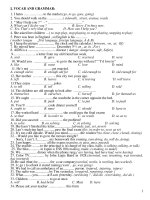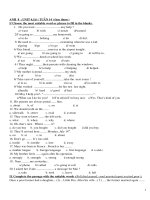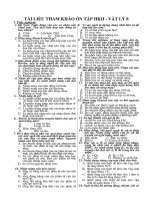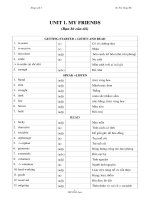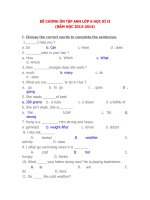Đề cương ôn tập Anh 8 cho học sinh khá - giỏi
Bạn đang xem bản rút gọn của tài liệu. Xem và tải ngay bản đầy đủ của tài liệu tại đây (179.77 KB, 17 trang )
EXTRA HELP DOCUMENT _ Đoàn Quang Định - 1 -
APPENDIX
Unit 1 Page: 3
o Present simple to talk about general truths.
o Enough: (Not) adjective + enough + to-infinitive
Unit 2 Page: 3
o Be going to
o Adverbs of place
Unit3 Page: 4
o Reflexive pronouns
o Modals: must, have to, ought to, should, may, can, could
Unit 4 Page: 6
o Past simple tense: used to
o Prepositions of time: in , on, at, after, before, between
Unit 5 Page: 6
o Adverbs of manner
o Reported speech with “ commands, requests & advice”
Unit 6 Page: 7
o Present simple with future meaning
o Gerunds
Unit 7 Page: 8
o Present perfect with “ for & since”
o Comparison with
“ like, (not) as ….as, (not) the same as, different from”
Unit 8 Page: 8
o Present progressive
• Talk about future
• Complaint with “ always”
o Comparative and superlative
Unit 9 Page: 10
o Purpose phrase: in order to, so as to, to
o Future simple
Unit 10 Page: 11
o Passive form
o Adjective followed by - an infinitive
- a noun clause
Unit 11 Page: 13
o Past participles and present participles
o Requests:
Would / Do you mind if …?
Would / Do you mind + V-ing ?
Unit 12 Page: 13
English 8 Schoolyear:2009-2010
EXTRA HELP DOCUMENT _ Đoàn Quang Định - 2 -
o Past progressive
o Past progressive with “When & While”
Unit 13 Page: 14
o Compound words
o Reported speech
Unit 14 Page: 15
o Reported speech : “ If & Whether ”
o Question words before to-infinitive
o Verbs + to-infinitive
Unit15 Page: 16
o Present perfect: “ Yet & Already ”
o Comparison of present perfect and past simple
Unit 16 Page: 16
o Sequence markers
English 8 Schoolyear:2009-2010
EXTRA HELP DOCUMENT _ Đoàn Quang Định - 3 -
Unit 1
Present simple to talk about general truths.
o We use the present simple to express general truths.
For example.
• The earth moves around the sun.
• The moon goes round the earth.
• The sun rises in the east and sets in the west.
• The bear sleeps during the winter.
• Today is Monday; tomorrow is Tuesday.
• Fish lives in the water.
• Water consists of main elements: Hydrogen and Oxygen
Use of “enough”.
o Enough is put before noun and after adjective.
For example
She hasn’t enough money to buy a new house.
There is not enough time to finish the test.
There wasn’t enough room for us to sleep
He has enough reasons to be angry.
S + V + Enough + N + To-infinitive
Enough + N + For + O + To-infinitive
The rope is not long enough.
She isn’t old enough to drive a car.
It is not old enough for her to drive a car.
I am fool enough to trust her.
S + Be + ADJ + Enough + To-infinitive
IT + Be + ADJ + Enough + For / Of + O + To-infinitive
---oOo---
Unit 2
Be going to : dự định
o We use “be going to” to express plans or intentions in the near future, it is
sure to happen.
For example
We are going to practice piano for two hours this evening.
She is going to travel abroad tomorrow.
o We also use “ be going to ” to predict.
For example
Oh, look ! it is going to rain. Look out, she is going to faint.
English 8 Schoolyear:2009-2010
EXTRA HELP DOCUMENT _ Đoàn Quang Định - 4 -
They are going to be married next May.
S + Be (am/is/are) + going to + Bare infinitive
Adverbs of place.
o We use adverbs of place to show the direction or position of people or things.
For example
He is not outside; Maybe he is inside.
They do not play football here; perhaps, they play there.
She is not upstairs; it is possible that she is downstairs.
Outside: bên ngoài Inside: bên trong
Here: ở đây There : ở đó
Upstairs: ở trên lầu Downstairs: ở dưới lầu
o We can also use prepositon phrases to show place: in, on, at, behind, in front
of, to the left of, to the right of, on the right, on the left.
For example
• We are sitting in the room.
• She stays at home
• The book is on the desk.
• She stands behind me
• Put the chairs in front of the board.
• Grow flowers to the left of the house.
• Keep standing on the right.
Unit 3
Reflexive pronouns
o We use reflexive pronouns to emphasize for Subject’s actions. It can stand
after main verb or object of main verb.
For example
He himself answered the phone, not his secretary.
He answered the phone himself.
o Reflexive pronoun usually refer to the subject of a sentence.
He looked at himself in the mirror.
o If we put reflexive pronoun after “ by ”, it means “ alone ”.
She lives by herself.
You must sleep by yourself tonight.
o The summary of reflexive pronouns
I myself ( tự tôi )
You yourself ( tự bạn )
He himself ( tự anh ấy )
She herself (tự cô ấy )
It itself ( tự nó )
You yourselves ( tự các bạn )
English 8 Schoolyear:2009-2010
EXTRA HELP DOCUMENT _ Đoàn Quang Định - 5 -
We ourselves ( tự chúng ta )
They themselves ( tự bọn họ )
Modals: must, have to, ought to, should, may, can, could.
o Must and have to both express necessity. It has the same meaning “ phải ”
For example.
• All students must take the term exam.
• All students have to take the term exam.
(There is no other choice. The exam is required.)
o In everyday statements of necessary, have to is used more commonly than
must. Must is usually stronger than have to and can indicate urgency or stress
importance.
For example.
• I’m looking for Sue. I have to talk to her about our lunch
date tomorrow. I can’t meet her for lunch because I have
to go to a business meeting at 1:00.
• Where is Sue ? I must talk to her right away. I have an
urgent message for her.
o Should and ought to have the same meaning “ nên ”: they express
advisability.
For example.
You should study harder.
You ought to study harder.
Drivers should obey the speed limit.
Drivers ought to obey the speed limit.
o Can (có thể) usually expresses the idea that something is possible because
certain characteristics or conditions exist. Can is also used to combine
possibility and ability.
For example.
• Tom is strong. He can lift that heavy box.
• I can play the piano. I’ve taken lessons for many years.
• You can see fish at an aquarium.
• That race car can go very fast.
o May also has the same meaning as can, but its degree is less than 50 %
certain.
For example.
• I can walk to school. It’s not far.
• I may walk to school. Or I may take the bus.
o In affirmative sentences about past ability, could usually mean “ used to be
able to”. The use of could usually indicates that the ability existed in the past
but does not exist now.
• When I was younger, I could run fast.
o Could can be used to make suggestions.
English 8 Schoolyear:2009-2010
EXTRA HELP DOCUMENT _ Đoàn Quang Định - 6 -
• Why don’t we go on a picnic?
• We could go on a picnic.
Modals + bare infinitive
Unit 4
Past simple tense: “Used to”
o We use “ used to ” to express the past habits. But now they don’t exist any
longer.
For example.
When she was a little girl, she used to swim in this river.
When we were in grade 7, we used to play soccer.
Used to (thường) + Bare infinitive
Prepositions of time: “ in , on, at, after, before, between ”
o In (vào) + (second / minute / hour / day / week / month / seasons / year )
In 20 seconds, she will leave here.
They start working in spring and end in summer.
She always gets up at 5.00 in the morning.
I was born in 1978.
o On (vào) + (holidays / days in a week / date)
• We are going to have a party for my mom on March 8.
• He has Math on Monday, Wednesday and Friday.
o At ( lúc ) + ( hour time )
• Minh goes to sleep at 10.00 p.m.
o After (sau)+(second/minute/hour /day/week/month/seasons/year)
o before ( trước )+(second/minute/hour /day/week/month/seasons/year)
• After 20 seconds, she will leave here.
• They start working before Spring and end after Summer.
• She always gets up after 5.00 .
o Between …..and ……(giữa …..và ….)
They will build my house between January and September.
Unit 5
Adverbs of manner.
o We use adverbs of manner to modify main verb in a sentence, it stand behind
intransitive verb and behind objects of transitive verb.
Adjective + ly => Adv
m
Safe safely
Happy happily
Magical magically
Beautiful beautifully
For example.
• We learn how to drive safely.
• She sings beautifully
• I know he behaves badly.
English 8 Schoolyear:2009-2010

